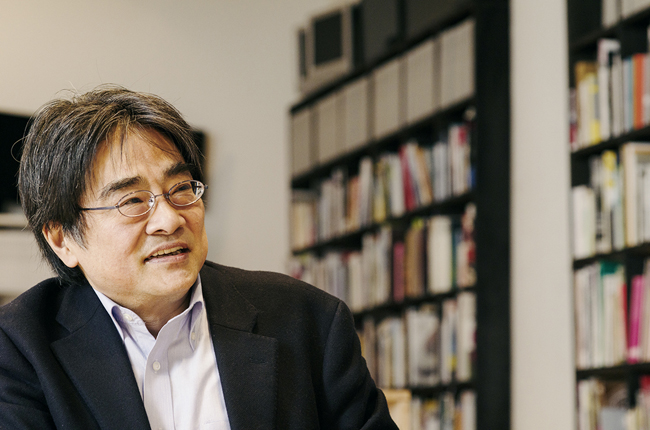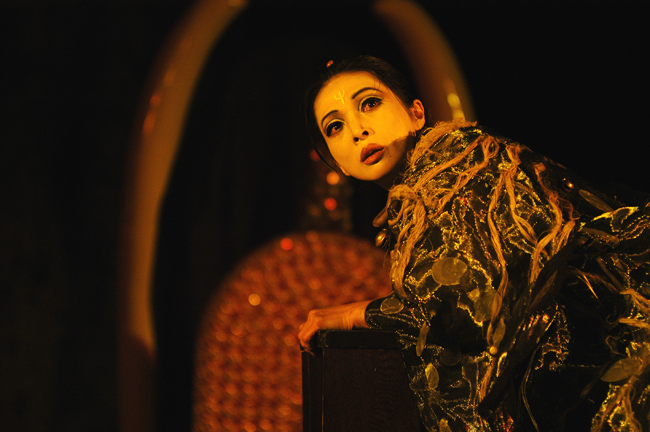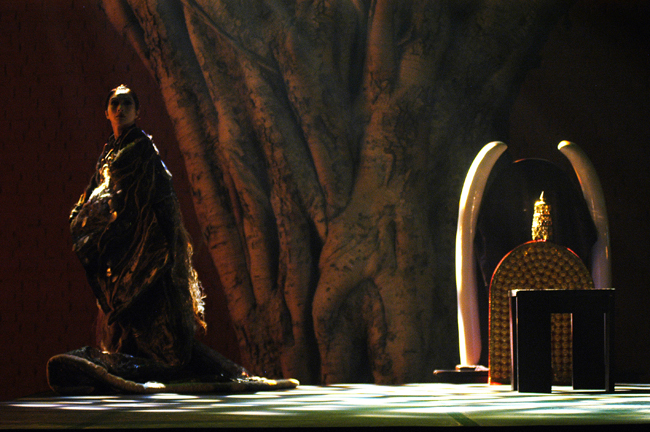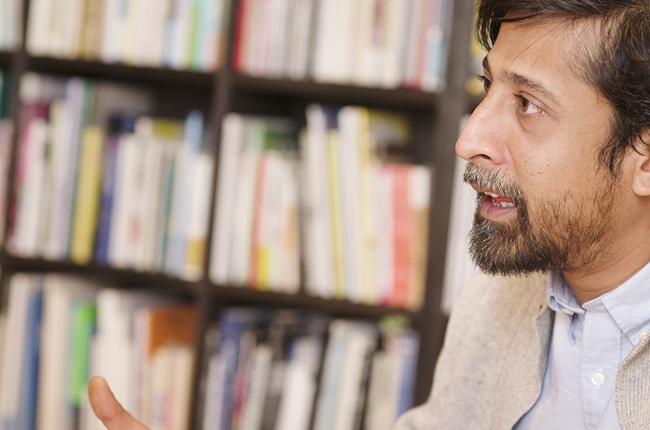Founding theater group "the Theatre Roots and Wings" in Delhi
Uchino: Okay. So after completing TTRP, what did you do?

Sankar: I went back to Delhi.
Uchino: You went back to Delhi? Not to Kerala?
Sankar: Not to Kerala. Because it was also important for me to set up something. To establish and get visible was important in my career at that time. I went back to Delhi and set up my theater group there.
Uchino: Your theater group, the Theatre Roots and Wings.
Sankar: Yes.
Uchino: Was started in Delhi but it's still in Delhi?
Sankar: No. It then moved to Thrissur. Now, it moved to the jungle in Attappadi.
Uchino: Okay, so you started to establish yourself in Delhi. What kind of theater were you doing in Delhi? You were again devising something?
Sankar: I was specifically looking at theater without words.
Uchino: Before you met Ohta Shogo's work?
Sankar: I had Ohta Shogo's work in my mind but it was too big for me at that time to even approach. So, I was looking at say, Samuel Beckett's Act Without Words or there's this Australian playwright Richard Murphet. His plays like Quick Death are written similar to Act Without Words written as a sequence of actions, rather than dialogues. So, I was looking at shorter pieces, 45 minutes, 30 minutes, small cast, and non verbal in order to find an approach to work without language. It was also my way to work in a context that is linguistically very diverse.
Uchino: What kind of people was your audience in Delhi?
Sankar: We got the theater-going crowd.
Uchino: That's the middle class?
Sankar: Yeah. I would say.
Uchino: Okay. So, how long did you work in Delhi?
Sankar: A year and a half.
Sahyande Makan - The Elephant Project
Uchino: And, when did your decision come to go to Kerala?
Sankar: And then, there was a workshop organized by the Japan Foundation with Mikari*8 , a female actor, from Japan. And, I had seen Mikari come and perform in Kerala in 1997. They had this production called Tenshu Monogatari, which traveled to Kerala, and left a very strong impression on me. Then, during my studies in Singapore, I came across the same group performing there and Singapore Esplanade Library had this huge image of Mikari.
*8 Mikari (1962- ) is a Japanese actor. As a high school student, she played a role in one of Shuji Terayama's productions. In 1990, she joined in the founding of the theater company Ku Na'uka headed by Satoshi Miyagi, where she succeeded as one of the lead actor of the company. After taking time off from performing with Ku Na'uka, she has expanded her activities as an independent actor including a number of movie appearances.
Uchino: Really? That's impressive.
Sankar: And then, Mikari comes with Miyagi Satoshi*9 's production of Medea to Delhi. And then, Japan Foundation organized a workshop for all of us. And then in October 2007, when we came with the production Performing Women – 3 Reinterpretations from Greek Tragedy to Japan in Tokyo, I met Mikari for the postproduction party. At that time I gathered my courage to propose a piece of collaboration. After looking at the proposed script, she said it's a bit too old fashioned, and she declined!
*9 Satoshi Miyagi (1959- ) is a Japanese theater director. He dropped out from the University of Tokyo's Faculty of Letters and founded the theater company Ku Na'uka in 1990. He attracted attention with his unique, Bunraku-style stage direction where the narrators are managed separately from the performers of the moves and dances. His representative works include "Tale of a Castle Keep (Tenshu Monogatari)", "Medea", "Antigone"among others. Since 2007, he has been the general artistic director for Shizuoka Performing Arts Center and is now also the director of Tokyo Festival (2018 - 2020).

Photo: Thyagarajan
Uchino: How did this happen?
Sankar: We met and she with her little bit of English, she said, "okay, tomorrow, I book a studio. Let's work in the studio and see". So, in the studio, we met, we spent around 2 hours and shared my text and ideas and then she said no. Then, I went back to India very challenged. What would challenge this actor? That was something which kept bugging and somehow it was like a flash in my mind. A poem 'Sahyande Makan' which translates as Son of the Western Mountains, from my childhood came into my mind. It's about an elephant. So I proposed her, can you play a male elephant? Her love for nature and quest for a primal approach to performance matched this proposal. That she took up as a challenge. So then, the process for that piece has to be in Kerala because it's a Malayalam poem and it's about the elephant. So, she has to know. So the rehearsals – for that I shifted to Kerala and Thrissur. That's what brought me to Thrissur.
Uchino: As an extension of doing that, you decided to move your company to Kerala?
Sankar: Yes.
Uchino: But Kerala is very different, right? It's not Delhi. They don't have middle class theater going public there.
Sankar: It's people from all walks of life who are eager and hungry for theater.
Uchino: It's more chaotic, in a good way. I saw the audience when I went to the festival. So, you studied theater but you changed your way of thinking about theater because of the change of the comfortable space and contours of the audience and class.
Sankar: Yes. The audience, the space, my collaborators, and the context was very different now.
Uchino: And, you brought your actors to Kerala?
Sankar: Yes. And, we rehearsed in three segments. The first rehearsal was for 2 weeks.
Uchino: That's about the elephant.
Sankar: The elephant. So, we traveled around.
Uchino: What was the name of the work?
Sankar: Sahyande Makan- The Elephant Project was the name of the piece.
We did research and Mikari-san – we couldn't translate the poem like in the paper, so we had to go and look for all these elements in life. So, it required a lot of travelling. Mikari-san was very particular. If there is a mention of a plant in the poem she wants to see what that plant is. And then, it went into this very deep sort of field study understanding. Even going to the jungle dangerously close to the elephant, following wild elephants, or getting acquainted with domestic elephants. Mikari-san wanted to make friends with an elephant. So, she had one elephant whom she would wash and scrub. So, for all this we had to be in Kerala. That was 2 weeks and then she went back. Then, I think the second phase was also like a 20-day phase where we got a rough structure of the poem, translated in space in time in her movement. Then, we took another break and then we had 2 months of rehearsal on which the structure was then adapted into a performance, and we opened it in Trivandrum, Kerala.

Photo: Thyagarajan
Uchino: I remember it was an outside performance.
Sankar: Yes, outside. We had two versions. We have the outside version and also a very minimal indoor version as well.
Uchino: What was the language used?
Sankar: I was speaking the poem on stage in Malayalam. There were subtitles. I speak for first 10-12 minutes, but then after that like the next 1 hour is Mikari-san's mostly non verbal solo performance.
Uchino: Can you tell the readers about what the work in more detail?
Sankar: Yes. In Kerala, there are many domesticated male elephants, which are trapped and caught from the western mountains. They are used for logging and for temple processions. They are not allowed to mate, because it brings a huge liability on the owners of the female elephant. As a result, the males have an excess of testosterone in their bodies. This causes them to go into a state of hallucination and short temper for a period of two to three months, every year. They are kept in captivation during this phase because they are extremely dangerous. In 1947, Malayalam poet Vailoppilli Sreedhara Menon witnessed the shooting of a huge, hallucinated elephant running amok during a temple festival. The poet imagines the interiority of this elephant, which forgets the fact that he is a domesticated elephant in a temple festival, and slips into the intoxication where he finds himself in the wild. His passionate tryst with the wild and other wild cow elephants is what actually translates as the violent death and destruction he is causing outside. And when the violence became unbearable, the elephant is shot dead. The poet ends with a profound question, followed by a statement: 'Did the sleeping stone gods of humans inside the temple hear the earth shaking scream of that dying elephant? But it was heard as an echo in the Western mountains, sad, having lost one more of her dear child'
Elephant for me became a very strong metaphor for nature because if you look at the way an elephant uproots a tree and throws it, you know how strong nature is. Also, if you look at the way man has domesticated elephant, you can see how fragile it is. So, this was a very strong idea that I had. Also, we had these really big figures being toppled from power like dictators getting toppled, like Saddam Hussein being killed. If a person becomes too big for a society then the society will eradicate that person. For me that is also the elephant. When it runs amok in its madness, the society can't take it anymore. It will mercilessly destroy, kill the elephant. The downfall, a loss of life summons compassion. So, these were the larger themes with which I worked on the piece.
Uchino: And, if I remember correctly I think there was a certain degree of seemingly traditional elements in the work. Did you use traditional artists? Or you trained your actors to do some kind of traditional movements and gestures?
Sankar: I have trained in Koodiyattam*10 under G. Venu*11 , and we used some of its vocabulary, not techniques. Its particular way of establishing a relationship with the audience and the body with the audience. The question was how we can draw from that to create a contemporary performance.
*10 Koodiyattam is a dance drama written in Sanskrit that exists from ancient times in the state of Kerala. Known also for the showy makeup and exquisite costumes that the performers wear, it is designated by UNESCO as a Masterpiece of the Oral and Intangible Heritage of Humanity.
*11 Gopal Venu (1945- ) learned the Kathakali dance from the age of 13 and then went on to receive training in Koodiyattam. While conducting research on various traditional performing arts in Kerala, he mastered the art forms himself. From the time he founded the Natanakairali Research Training and Performing Centre for Traditional Arts in 1975, he has been active in promoting traditional performing arts and has many publications with a particular emphasis on actual practices. He is also greatly experienced in conducting performances and workshops overseas.

Uchino: And the music?
Sankar: Music. Yeah. It's contemporary but we have used traditional instruments.
Uchino: So, all the musicians in the production were those who worked with you for a long time or you just hired them for this particular production?
Sankar: They have all been my collaborators from the past.
Uchino: I thought it was a very successful production but did it travel or tour?
Sankar: Within India it traveled extensively. We also traveled to Korea with that piece.
Uchino: Okay, but it didn't reach Tokyo.
Sankar: It didn't reach Tokyo.
Uchino: That's too bad. When was that?
Sankar: 2007, 2008 and a bit of 2009.
Uchino: And you moved your theater company back in Kerala and kept creating other works as well after "The Elephant?"
Sankar: Yes.






